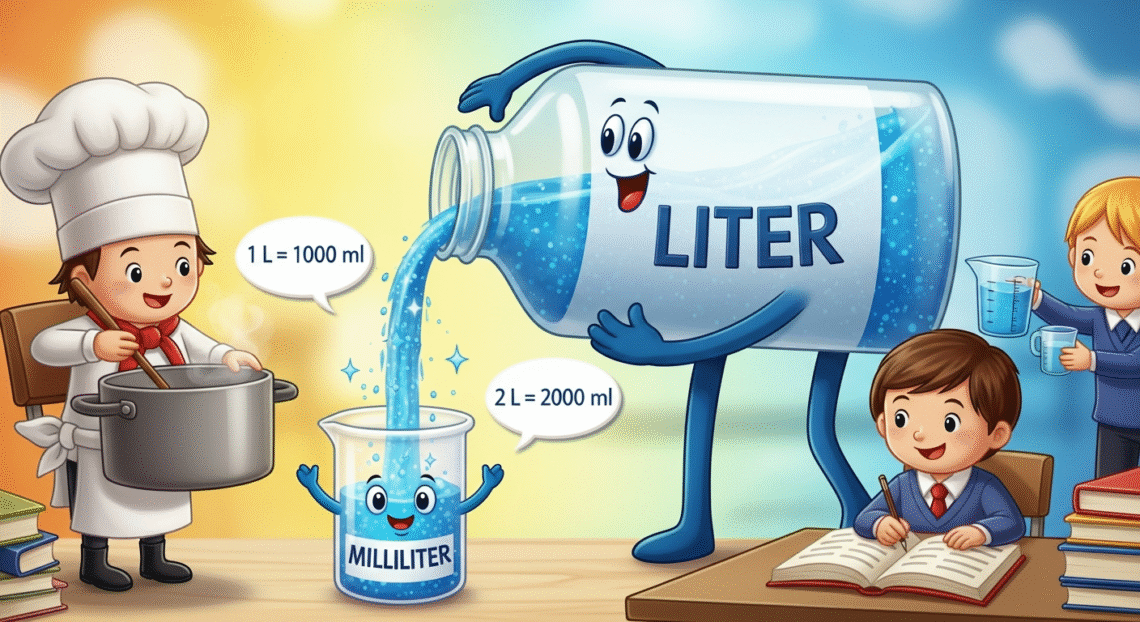l to ml is a simple way to change liters into milliliters. If you are cooking, studying, or measuring liquids, knowing how to convert l to ml is very important. One liter is equal to one thousand milliliters. This means if you have 2 liters of water, it is the same as 2000 milliliters. Many people get confused when using l and ml because both measure liquid, but ml is smaller than l. Using l to ml conversion makes it easy to know exactly how much liquid you have or need.
Understanding l to ml is not only helpful in the kitchen but also in science class, for health, or even in daily life. For example, if a medicine bottle says 0.5 liters, you can quickly know it is 500 ml. This makes calculations simple and avoids mistakes. In this guide, we will learn how to convert l to ml quickly, understand easy tricks, and see examples in real life.
What is l to ml? Simple Explanation
l to ml means changing liters into milliliters. Liter (l) is a bigger unit of liquid, and milliliter (ml) is smaller. One liter equals 1000 milliliters. So, when you convert l to ml, you multiply the number of liters by 1000.
For example:
- 1 liter = 1000 ml
- 2 liters = 2000 ml
- 0.5 liters = 500 ml
How to Convert l to ml Step by Step
Converting l to ml is very easy. You just follow a few simple steps:
- Find the number of liters – Check how many liters you have.
- Multiply by 1000 – Multiply the liters by 1000 to get milliliters.
- Write the answer in ml – The result is your measurement in milliliters.
Example:
If you have 3 liters of juice:
3 × 1000 = 3000 ml
So, 3 liters = 3000 ml
Easy Formula for l to ml Conversion
The formula is simple:
Milliliters = Liters × 1000
Some examples using the formula:
- 0.5 l × 1000 = 500 ml
- 1.2 l × 1000 = 1200 ml
- 2.75 l × 1000 = 2750 ml
Common Mistakes in l to ml Conversion
Even though l to ml is easy, some people make mistakes. Here are common ones:
- Not multiplying by 1000 – Some forget to multiply and write 2 liters = 2 ml (wrong!).
- Confusing liters and milliliters – Remember, ml is smaller than l. 1 l = 1000 ml.
- Decimal mistakes – If you have 0.75 liters, it equals 750 ml, not 75 ml.
Real Life Examples of l to ml
l to ml is useful in everyday life:
- Cooking: Recipes often need ml for precise measurements. For example, 0.5 l of milk = 500 ml.
- Medicine: Medicine doses can be written in ml. 2 l of water is 2000 ml.
- Science experiments: Lab measurements use ml instead of liters for accuracy.
- Drinks and beverages: Bottles often show liters and ml. 1.5 l soda = 1500 ml.
Quick Tips to Remember l to ml Conversion

Here are some easy tricks to remember l to ml:
- Think 1000 – Every 1 liter = 1000 ml.
- Use simple multiplication – Just multiply liters by 1000.
- Write decimals carefully – 0.25 l = 250 ml, not 25 ml.
- Practice with small examples – Try converting 1, 2, or 0.5 liters to ml.
Why l to ml is Useful in Daily Life
Knowing l to ml helps in many situations:
- Cooking and baking: Recipes need accurate liquid measurements.
- School and homework: Science problems often ask for conversions.
- Health: Medicine doses and water intake are easier to track.
- Shopping: Some bottles show liters, but you may want ml for exact usage.
Fun Practice Examples
Try converting these:
- 4 l to ml = ?
- 0.75 l to ml = ?
- 2.5 l to ml = ?
- 1.2 l to ml = ?
Answers:
- 4 × 1000 = 4000 ml
- 0.75 × 1000 = 750 ml
- 2.5 × 1000 = 2500 ml
- 1.2 × 1000 = 1200 ml
Conclusion
l to ml conversion is very simple but very useful. One liter equals 1000 milliliters, and using the formula ml = l × 1000, you can convert any liquid measurement quickly. Understanding l to ml helps in cooking, school, science, health, and daily life. Avoid common mistakes, practice regularly, and use our tips for fast conversion. Once you get the hang of it, measuring liquids becomes easy and accurate.
FAQs
Q1: What does l to ml mean?
A1: l to ml means converting liters (l) into milliliters (ml). 1 liter = 1000 milliliters.
Q2: How do I convert 0.5 liters to ml?
A2: Multiply 0.5 × 1000 = 500 ml.
Q3: Why is ml smaller than l?
A3: A liter is a bigger unit of liquid, and ml is 1/1000 of a liter, so it measures smaller amounts.





